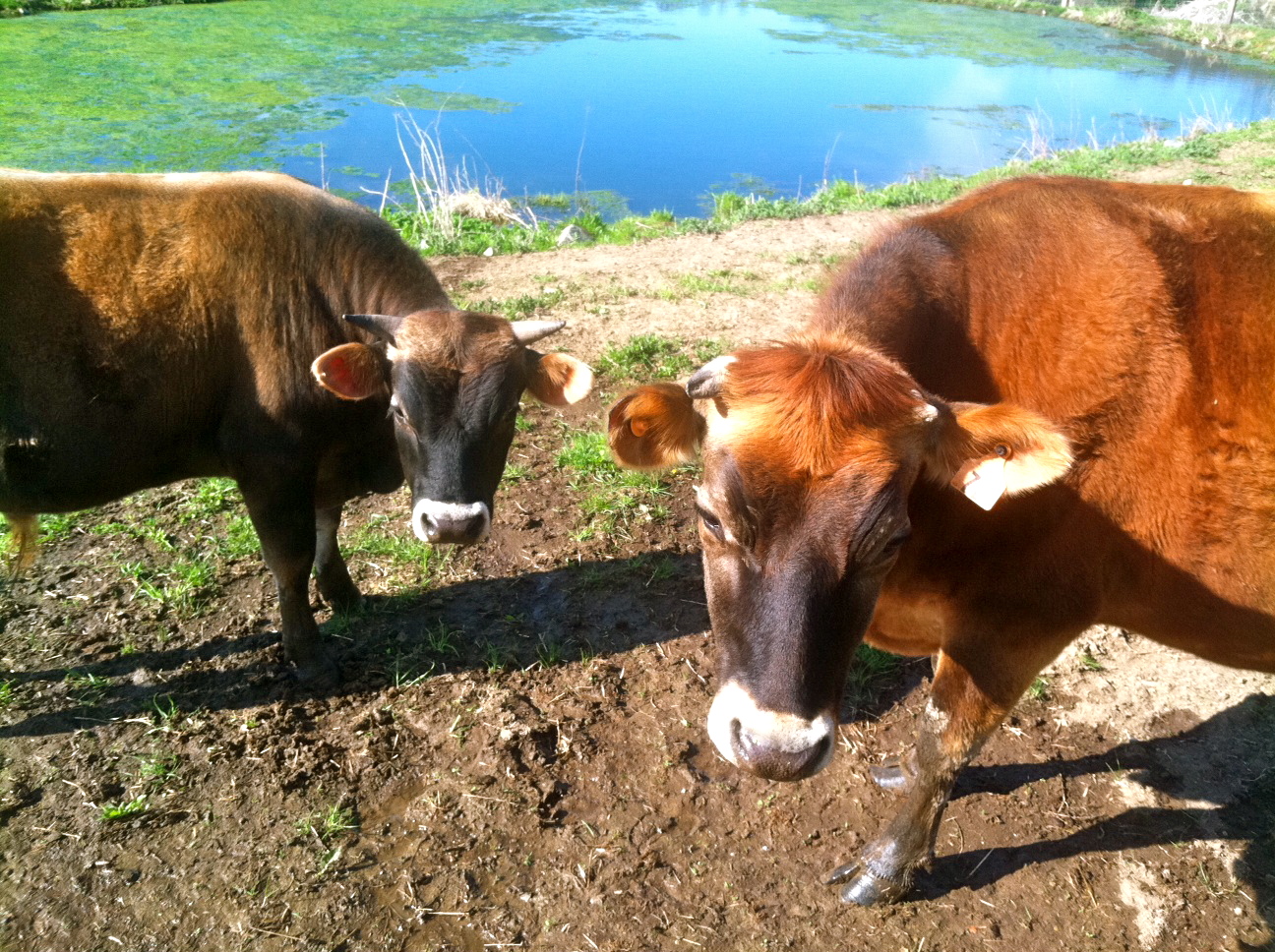“April is the cruelest month,” wrote TS Eliot in what is arguably the only comprehensible line in his most famous poem, “The Wasteland”. He was being ironic, of course, pointing out the cruelty of fresh tendrils of spring-borne life gaining succor from the death and rot of a previous generation.
This year on the farm, November proved to be the cruelest month for similarly ironic reasons. Let me explain:

If you have been to the farm, you have already met Maisey and Delilah, our Jersey heifers, our great white hope. By great white hope, I refer to the anticipated flow of butterfat rich milk, for which Jerseys are renowned. For the past year and a half we have been trying like mad to get the heifers knocked up so that we can proceed with the business of making butter and aging cheese.

And here, rendered by the deft hand of my daughter Gwendolyn, is Cecilia, our resident calico cat, taking time out from her favorite pastimes: hauling in rodents half her size, rolling around on her back and ambushing our black cat, Alice. A transplant from New York City, Cecilia arrived at the farm three years ago and quickly earned a reputation for wide-eyed curiosity, pattering about the packing shed at 3 in the morning as we loaded the truck for market. Or watching at a sly distance in the barn as the heifers and goats butted heads over the hay piled up before them, her instincts grasping that one day, the entitlements due a seasoned barn cat would include a daily bowl of warm fresh milk…
Ah, that milk! How to get it? Plan A had been to watch for one of the heifers to come into heat and then call the Select Sire man to insert “sexed” semen that has been mined from some hunky Jersey bull. “Sexed” semen is a technological breakthrough that has come on the market in the past decade: imbued with superior genetics, the semen is run through a centrifuge that separates the X (female) chromosomes from the Y (male) chromosomes. Inserted into a cow’s uterus, “X” laden semen promises a 93% chance of female offspring, an outcome which would not only increase the size of our milking herd but would spare me a future confrontation with my conscientious daughters over my refusal to keep a young male calf in the pasture as if he were a pet.
Here is a painting of Delilah done by Gwendolyn when Delilah was less than a year old:

One thing I have learned is how to tell when a cow is in heat: she will bawl incessantly. Or one of the cows will try to mount another cow. If Maisey tries to mount Delilah and Delilah scoots away, Maisey is in heat. But if Delilah stays there, Delilah is the one in heat.
Three times when one of the heifers came into heat, I called the Select Sire man to come out and artificially insert “sexed” semen.
And thrice they refused. I called a Veterinarian, who reached deep into both heifers to check on the plumbing and shrugged: “They should be able to bear. Keep trying.”
Well, I was paying good money for those elite gender biased genetics. It may be the case, I thought, that what the heifers would respond to was….the real thing.
So enter Plan B, aka Squirt.

Squirt was a yearling bull in my friend Harold’s pasture, a randy young creature whose growing passions were making life difficult for the other inhabitants of Harold’s pasture. Squirt stood a good hand and a half shorter than Maisey and Delilah when he entered my pasture back in April. And boy, what an introduction ensued: the spit firing hormones, the charade of emotions, the beefy animals circling and crooning, their motivational centers gone haywire on account of some musk that provoked no sense of rapture from me.
The new approach seemed messy, random, unscientific. Squirt brought to mind another Nobel laureate poet, Seamus Heaney, who, drawing much of his inspiration from the farm he was raised on, published his first collection, Death of a Naturalist, a year after TS Eliot’s death. The outlaw in Heaney’s poem, “The Outlaw”, is an unlicensed service bull. Heaney describes the brief business transaction that transpires the day he takes a cow to visit this bull:
His knobbled forelegs straddling her flank,
He slammed life home, impassive as a tank,
Dropping off like a tipped-up load of sand.
There’s no ambiguity about Heaney’s word choice here. Years ago, before he won the Nobel Prize, when I was just out of college and I fancied myself a budding poet, I met Seamus Heaney at Grasmere, in England’s Lake District. I was riding my bicycle through the region and was lucky enough to have a friend who was presenting a paper at the William Wordsworth Conference there. He was a big man, as I recall, a framework fit for farm chores, a big man with a magical voice and a genius for teasing perfect meanings out of his words. A very different poet from TS Eliot. In retrospect, I must have imagined myself, just out of college, to be more in the metaphysical, opaque camp of a TS Eliot. But these days, I keep a collection of Heaney by my bedside.
At any rate, I would never have imagined back then that I would one day earn my keep as a farmer. I watched the interactions between Maisey and Delilah and Squirt, watched to see the young stud “slam life home”, but every time Squirt tried to straddle one of them with his “knobbled forelegs,” my girls slipped out from under him. Maisey and Delilah just ignored him, as though he was some pesky little brother.
Whatever. The demands of a vegetable farm distracted me from the pasture as spring gave way to summer but every so often I wandered absent-mindedly into Squirt’s realm, to mow the pasture or to retrieve a water container, only to find myself resorting to rodeo clown antics for survival, shooing and waving and backing away from this hoofing beast that wanted to square off with me. By summer’s end, Squirt stood as tall as the gals he had been brought in to mount. And yet, every time he tried to do his thing they scooted away coquettishly and then held counsel among themselves. Clearly, we had a dearth of fertility up here on the hill. Or maybe the girls just wanted to hang out and chew cud a little while longer, without the burden of raising children. Like so many twenty and thirty and forty somethings out there still living with mom and pop, Maisey and Delilah longed for an extended adolescence.
And poor feckless Squirt took to bawling his nearly soundless bawl, having been metaphorically castrated by two heartless heifers. By the time we were pulling tomato stakes out of the ground, I deemed him too dangerous to keep in my pasture. My God, what if a fallen tree broke the fence down and he raced into the neighbor’s yard to enact his sexual frustration? Harold informed me that he wanted to put Squirt to the auction, which made me sad because I had grown fond of the rambunctious beast and there was virtually no chance anyone would buy him, horns and all, for a service bull. In exchange for his reproductive services to me, I had fattened him on my pasture. Within a few weeks, he would be meat.
Hetrick was called in. Hetrick is the guy with the trailer who shuttles livestock to an fro for a reasonable fee. Everybody calls him Hetrick but he prefers to be called Brian to his face. I sequestered Squirt in the barnyard and Hetrick backed his trailer up and together, Harold, Hetrick and I began coaxing and teasing Squirt, who must have known where all of this was leading because he reared and bucked and ransacked the barn in his efforts to stay put. But Hetrick was a pro at these situations and somehow managed to get a frantic Squirt to gallop thunderously up the ramp into his trailer.
After Hetrick pulled away, I was overcome with gloom. Of course, I know that on a farm it is business as usual to send livestock males to the butcher but I was new to livestock farming. Plus, to make matters worse, I found poor Cecilia dead in the barn, probably trampled to death by Squirt in his last fight to stay alive. A victim of her own insatiable curiosity.
Well, I thought, time to get all of my bad news over and done with. I called for the veterinarian to get a pregnancy test for my two prudes, knowing full well that it is business as usual on a farm to send sterile cows to the butcher, too. Maisey was easy to rope to a fence but Delilah put up her usual fight. She was almost as tenacious as Squirt in preventing me from tying her down for the preg test but the Vet helped out and soon we had her, too, under control.
Well…all I can say is that Squirt did not venture into my pasture solely to put on weight. And like most of us, they went about their business with the utmost discretion because none of us even knew. I suppose Squirt had to grow some more to gain my girls’ respect because it took about two and a half months from his first day on my farm to make them both pregnant, which is a lucky thing because the calves are due in early March and not the dead of winter.
Needless to say, we are all celebrating on the farm: thumbing through cheese recipes and studying the chemistry behind mold and shopping for butter churns and pasteurizers and cheese molds. Blueprints are being cobbled together for a makeshift milking parlor and a cheese room. The cheese room is the bovine equivalent of a nursery. Who cares whether it’s a boy or girl?
Two lives taken, and two given. Goodbye Squirt. Goodbye Cecilia.
And goodbye Seamus Heaney, who died in August at the age of 74. Somewhere on the planet, a future Nobel Laureate is submitting his first collection of poetry. All I know is it ain’t gonna be me.
Happy Thanksgiving!
Tim
































